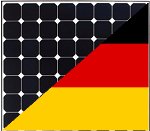The solar energy industry will invest nearly 10 billion euros in Germany over the next four years according to research conducted on behalf of the Bundesverband Solarwirtschaft (BSW-Solar), the German Solar Industry Association.
Germany’s solar power industry will route 14 percent of its turnover in additional expansion. The investment rate in the conventional German energy industry is only half that at 7 percent. In 2009 alone, investment of approximately 1.5 billion euros was ploughed into the German photovoltaic industry to expand projects.
The industry will invest a billion euros in research and development by 2013, the goal being to make solar electricity competitive with conventional electricity within a few years. For residential solar power system owners, the costs of electricity from their own roof tops will fall below the tariff level of conventional electricity providers by 2015, at the latest, according to estimations.
Coupled with Germany’s feed in tariff program, one of the most generous in the world, demand for home solar power systems in recent weeks has grown enormously due to significant price reductions. Demand has been such that the threat of a solar panel and power inverter shortage looms large and local manufacturers have orders for equipment backlogged well into 2010.
The German photovoltaic industry current employs around 54,000 people. In excess of 10,000 new jobs in manufacturing, commerce and trade were created in 2008 alone. The industrial turnover amounted to some 9.5 billion euros last year, growing by nearly 60 percent over 2007. The export rate is approximately 50 percent.
The Australian state of New South Wales recently announced a revamp of its Solar Bonus Scheme; switching to a German style gross feed in tariff that will pay AUD 60 cents per kilowatt hour for all electricity generated by a solar power system. While the legislation is yet to pass, interest in New South Wales in solar power has skyrocketed since the announcement, echoing the example set by Germany that a gross feed in tariff is one of the best ways to stimulate solar power uptake.












































